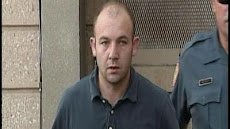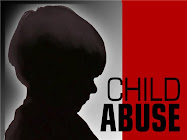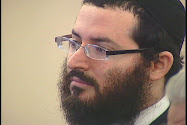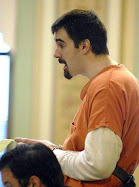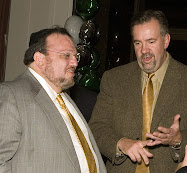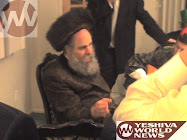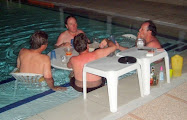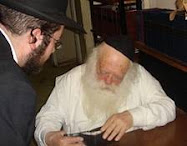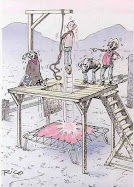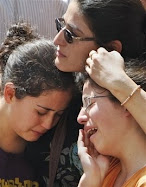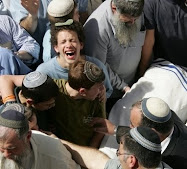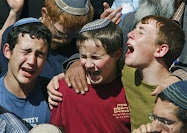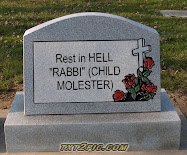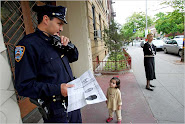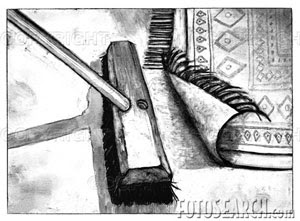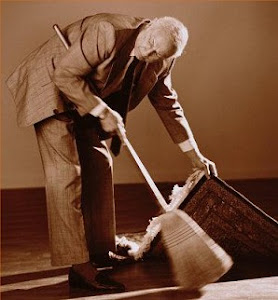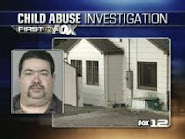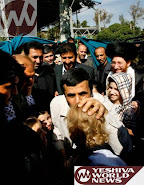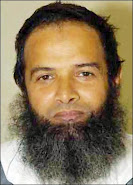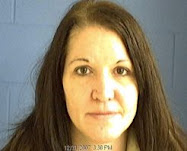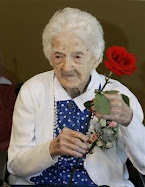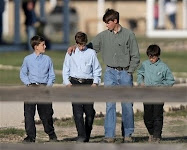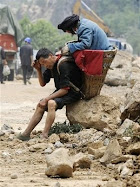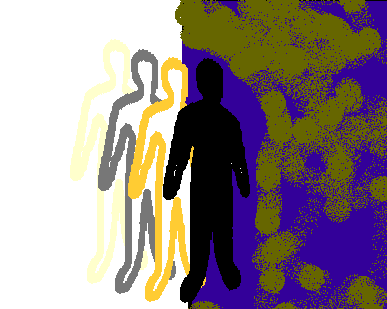

http://thejewishstar.wordpress.com/2009/09/02/good-touch-bad-touch/
How to talk to your kids about a touchy subject
By Mayer Fertig
Beyond the new clothing, a knapsack and school supplies they buy for their young students, moms and dads need to consider if their children are equipped with the information they’ll need to protect themselves from an adult, or even another child, who seeks to betray their trust. “Parents need to teach their children about good touch and bad touch,” said psychologist Michael Salamon of ADC Psychological Services in Hewlett. “Use themselves and their medical doctors as an example,” he suggested, “how the doctor will never examine them without Mommy or Daddy in the room, and anyone who wants to touch them, unless Mommy or Daddy says it’s okay, they should stay away and tell Mommy and Daddy about it.” Second grade is the latest age to have that conversation, Salamon said, and it should be repeated “at every age”; another therapist suggested children first receive age-appropriate warnings about abuse when they are as young as four years old. Context is important, stressed Dr. Asher Lipner, vice president of the Jewish Board of Advocates for Children, and a therapist in private practice. “Don’t make it out of the blue — ‘Everything’s fine in life, nobody’s going to hurt you but watch out for sexual abuse.’ “You have to teach your kids about their rights,” he urged, “that they have the right to expect that nobody will hurt them physically, or emotionally or even spiritually.” Children should be told, “If a kid or an adult tries to get you to do something you don’t want to do, you have the right to say no if it is something which is invading your privacy, such as touching you in your private place or touching them in their private place,” Lipner explained. A patient who suffered abuse as a child “focused her chinuch so much on this, and in a positive way,” Lipner said, “that your body is special and a gift from Hashem; that your private places are especially yours, and that nobody is even allowed to look.” A child’s vulnerability to predators is dependent to a great extent on the manner in which he or she is treated by their parents, said Lipner. He recalled an incident in which a six-year-old girl scared off a would-be abuser by saying, “That’s stupid and I’m calling the police.” “If parents are overly dictatorial, if parents are neglectful, if parents rationalize that kids don’t have the same needs as adults for autonomy, for being heard, then the kids are going to believe that people have the right to tell them what to do,” Lipner said. They may believe “that adults have more rights than them, and therefore if an adult wants to touch them…” “Parents have to treat their kids with a respect that doesn’t always come naturally,” he added, “because we all have the potential to selfishly put our needs before the needs of people who are more vulnerable — and children especially — because we mistakenly think that their emotional needs are not as strong or as important as those of adults.”
==================================================
http://jewishatheist.blogspot.com/2009/08/question-id-like-to-hear-orthodox.html
A Question I'd Like to Hear Orthodox Bloggers Discuss
Your son, a sweet, well-behaved boy, comes to you at age 16 and tells you he does not believe in Orthodox Judaism. He says that while of course he will not violate the laws of shabbat or kashrut in your home, he no longer wants to attend religious schools or participate in davening. He'd like to attend a secular school and start hanging out with non-religious and non-Jewish teens. He doesn't want to wear a kippah any more, either. You can tell that he is speaking from a place of integrity and genuine soul-searching, and you can also tell that his mind is made up.
Do you force him to stick it out in the Orthodox school? Coerce him into continuing to daven as long as he's living in your house? Make him promise to keep kosher and shabbos even outside the house? Forbid him from taking his kippah off at least while any of your friends, family, or neighbors might see? Or do you accept his wishes and support his choices, much as they pain you?
I've never seen an honest discussion about what to do when your kids go off the derech other than discussions about how to get them to stay or utter denial that it's even possible in your family.
It would be great if this became a meme that went through the Orthodox blogging community. I'll start by tagging Ezzie, Chana, DovBear, Orthoprax, and BrooklynWolf. Please tag some others in your replies.
Jewish Philosopher: Don't bother. We know you'd chain your kid to the radiator and try to beat the devil out of him.
====================================================
http://www.chabad.org/theJewishWoman/article_cdo/aid/969310/jewish/When-the-Bruises-Cant-Be-Seen.htm
When the Bruises Can't Be Seen
Living with Emotional Abuse
By Anonymous
Just like so many other women, I completed my education and then searched until I found the "right" one, married and proceeded to build a family, raising a string of wonderful children. We are a well-thought-of family—we are considered bright and successful, with good mannered children who are a joy to have in class. But we have a terrible secret.
I'm an abused wife—no, I have no black and blue marks to point to this fact; my husband generally doesn't stoop to outright blows. Actually, that's exactly what prevented me from reaching this inescapable conclusion many years ago, when leaving the marriage may have been less complex and foreboding.
My husband generally doesn't stoop to outright blows
My children hesitate to invite their friends over—they're either afraid that their father may shout and curse in front of their friends, or else the house is terribly messy because I'm still upset over the latest outburst and too depressed for the simplest housecleaning. As we live in Israel, Hebrew is my children's first language—but they could all reel off a string of curses in English from quite a young age.
It is sometimes hard for others to understand what an abusive marriage is like when there are few physical blows. But abuse, as I have come to learn, comes in many forms. And often it is the psychological, emotional and verbal abuse which is even more painful and traumatic than a punch in the face. People who live "normal" lives don't know what it is like to live under a dictatorship. But that is what it is like to live with an abusive spouse.
My husband commandeers the grocery list—if he deems a product to be necessary, only then may it be purchased. Whether repairs are made around the house is dictated by the amount of money he feels justified to spend. If he wants to buy something, it becomes a great need; if I would like to buy something, I will be interrogated as to its necessity. Everyday conversations are dominated by him, and he decides if and when to hold them, as well as their agenda; he may decide that he's not at all interested in listening to what he considers "unnecessary and irrelevant details" and will walk away from a conversation. Even daily quips and insights of our children aren't deemed important enough for his time, so I am left to experience them alone, as if I were a single mother.
If I cook beans, he wants turkey; if the food is hot, he wants it cold. I don't complain; I ask him what he prefers. He answers, sounding so innocent, "how would I know?" And I always end up feeling ashamed and discouraged that I didn't get it right, yet again. His feelings of anger, triggered illogically by the smallest of things, burst forth like a volcano time and again. When he shouts and rants at me, I feel my insides shrivel up into a little black nothingness.
As a young mother, I set out to make him a birthday surprise. Alas, the chocolate chip cookies I labored over weren't to his liking and again no praise, gratitude or even acknowledgment was my due. Years later, when his own daughters prepared the exact same thing, he was delighted and ate them voraciously.
Most families look forward to the Jewish holidays when they can spend quality time with each other and enjoy beautiful meals and traditions. But for me and my children, each and every holiday starts with outbursts and insults as well - we're eating too late or too early; how come [one of the kids] isn't at the table, or why are you forcing them to come. He's impossible to please, makes unpredictable demands, and the demands are always accompanied by shouting, insults, and curses. And then there are the terrible threats—I live in constant fear of reprisals.
Each and every holiday starts with outbursts
The festive Purim meal has always been a special source of distress. For years, the fun and laughter began only after I had retreated from the table in tears, in reaction to a string of undeserved insults and derogatory remarks. Somehow the "action" just couldn't get into full swing with me in attendance, and I could never join in the enjoyment, seemingly so well-deserved after all the cooking and cleaning I'd invested in the holiday.
When my children were young I always attended parenting groups, hoping that if I was a better mother things would be smoother. But I would leave the classes wondering why their advice didn't seem to help my "unruly" children, not realizing that it was not that my parenting skills were so lacking; it was the terrible tension, confusion, and uncertainty that my children live with that is to blame.
Praise from him is so hard to come by but at the same time he doesn't like me to socialize with friends, saying I should spend any spare time with him, begrudging even time spent together with the children. He's totally possessive of me, while at the same time disregarding my wants and desires.
My own feelings are discounted by him time and again as irrelevant, as his needs and feelings prevail at all times. Later, he wonders aloud why I don't enjoy talking to him and criticizes me for the fact that he's not up to date on many things going on in the children's lives and mine. And while he decides what and when I am allowed to feel emotionally, he also feels that physically I belong to him. My body has become his possession to invade at will and my feelings have been trampled to the ground, and I lack the inner personal strength to object.
I had been quite broad thinking and strong-willed when we first met, but gradually I find my entire scope of headspace becoming confined to the four walls of our house, slowing becoming my prison. I am entirely caught up in how to please the un-pleasable; I have lost my very conception of self and have given up decision making as being without purpose.
Afraid to speak, afraid to act, afraid to relax and just be myself; my "self" is melting away into thin air. My opinions are invariably disapproved of and my feelings discounted; I have no avenue of expression; my every move is monitored.
I consulted many friends and advisors over the years and, not truly understanding the abuse I was living with, they all gave me the same advice—be extra nice to him, eventually he'll act in kind. I tried so hard and for so long; unfortunately, even they didn't realize that in cases of abuse, it makes things even worse.
My perception of the situation began to change when I attended yet another talk on building a good marriage, a goal which had proved to be so elusive throughout the years. The speaker prefaced her talk by saying: "this doesn't apply to an abusive relationship— where there's abuse, there's no relationship." This left me in contemplation throughout her talk—is my marriage abusive or is it a relationship?
Eventually, our family system cracked and one of the children refused to go to school, exhibiting aggressive behavior so severe that a therapist was called in. Thank G‑d, the therapist was astute enough to address the real issue at hand, realizing that the child's behavior was an SOS call behalf of a family in distress.
Our family system cracked
Only then did I learn that abuse isn't confined to physical blows; it's the theme of power and the need to control that are the main defining factors. And that even in an abusive home there can be "good" times, but that "good" times do not compensate for the situation or make it acceptable.
Of course, discovering the root of the problem is only half the solution, as facing the issue squarely in the face brings a host of new questions and dilemmas:
Do I really love him or is it all a fixation and a result of his powers of charm, as part of the mechanics of abuse?
Is the marriage still viable—is there any chance of it healing or has too much damage already been done, to the relationship and to my psyche as well?
Would the children fare better in the familiar confusion, or is it healthier for them to be in a stable one-parent home?
Is staying together putting us all in further danger, since the possibility theoretically always exists that the abuse escalate to the physical with little warning?
What if I were to feel the need to run to a shelter? If I go by myself and leave the children at home, I will be deemed an irresponsible parent in the eyes of the law. I could opt to take the "little ones" – but I'm responsible for all those under eighteen, some of whom already have minds of their own (as they should). I envision it as a horrendous tug-of-war of what to do and who's on which side- an image much too awful to consider.
Is it better to include their teachers and the community in my journey, so that they may better understand the children's upheaval or is it better to maintain the facade, at least for a while longer, as our "false" identity is reassuring—or is that a continuation of unhealthy denial?
At present, all I have are questions, with a long road of recovery ahead of me, full of unfamiliar signposts along the way as I struggle to find the answers. I must still "be there" for the children, while at the same time struggling to find my own sense of balance. And even the experts can't know how long my own personal journey will take, as every woman's experience is different.
It seems to me that had we been given the same advice that we're getting now when we were first married, things may have been very different. Maybe we could have re-learned our roles and saved each other a lot of anguish. Or we may have recognized much earlier that this marriage was not viable and terminated it with fewer children involved, and as the children would have been younger, they would have been less exposed to the abuse and less affected by it.
On the one hand, I'm pleased that I stuck it out and allowed all these children to be born into this world, yet what a struggle awaits them all! The older ones exhibit towards me repeats of my husband's behavior, his habits of control and domination. They insist they know better than me what's best for the younger children, so the cycle continues. They are of marriageable age and yet don't recognize the problem—not in him and certainly not in themselves.
If you suspect abuse, don't wait for physical danger to address it
I feel a dire need to re-educate my children, but since I started going to therapy for myself my husband has denigrated it and discounted its value. I can only pray that they receive the guidance that they need at the proper time.
I feel like a tightrope walker teetering on the heights, swaying in the strong winds, struggling for balance as I am pushed and pulled in many directions. I must act as father and mother for my children as best I can, yet not stir up any anger towards my husband and accept all his wishes and demands with a smile, as I continue to try not to degrade their father in their eyes.
I do know that we met and married for a reason (my children are the proof of that). Although my faith in G‑d may falter and waver at times and I may be nauseous and dizzy from the extreme stress, I try hard to believe and accept that G‑d gives the power to overcome a challenge together with the challenge itself, as I've been taught, and that somehow, someway, we will all come out of this even stronger.
If you find yourself relating to my story personally, even if there's no violence in the home at all, you may be in danger: emotionally, psychologically, and physically. Open up your heart to your nearest and dearest friends (NOT to your husband or your children) and share with them what you're going through so they can support you emotionally. And if they cannot, find a professional, someone objective, who can listen to you and evaluate what is going on in your home.
If you suspect abuse, either in your own life or that of someone close to you, don't wait for physical danger to address the issue. Don't wait until the situation is totally out of control or until one experiences severe symptoms of PSTD (post-traumatic stress disorder), as I did, to seek help. The earlier one intervenes the better the prospects of recovery for both husband and wife, and the only possibility of living together as a healthy family unit.
It has taken me a long time to ask the right questions and get the proper advice and guidance. I am working through so much pain, anger and confusion, but I know that I am on the path to recovery and health. We all have the power to change, but we can only change ourselves. This is the month of Elul, the time of the year to focus on growth and repentance. My husband has his own work he must do, but for me, this is my time to ensure that I have the tools necessary to change. I just pray for the strength to work on myself and make the right decisions, so that this can truly be a happy and healthy New Year: emotionally, physically and spiritually.
The following are a few of the resources available for women who need help in dealing with an abusive relationship:
The SOVRI Helpline is an anonymous and confidential helpline staffed by trained volunteers who provide help, information, support, and referrals to survivors of sexual abuse. We don't have caller ID. Our volunteers are trained to understand the dynamics of sexual abuse. They also have training in listening and counseling skills, emergency department protocol, legal protocol, post-traumatic stress disorder, domestic abuse, childhood sexual abuse and incest, and recommending appropriate resources. Our volunteers are supervised by licensed social workers with extensive experience in dealing with these issues. SOVRI Helpline is under the auspices of Beth Israel Medical Center in Manhattan.
The helpline is open Monday-Thursday 9:30am-5:30pm and Friday 9:30am-1:30pm. The phone number is (212)844-1495.
Find Jewish resources by state through Jewish Women International.
To seek help in Israel, or any country outside the United States, contact Bat Melech, an organization providing freelegal counsel, a crisis hotline, shelters for women and children, and other assitance to women suffereing from abuse: batmelech.org/index-english.html








































